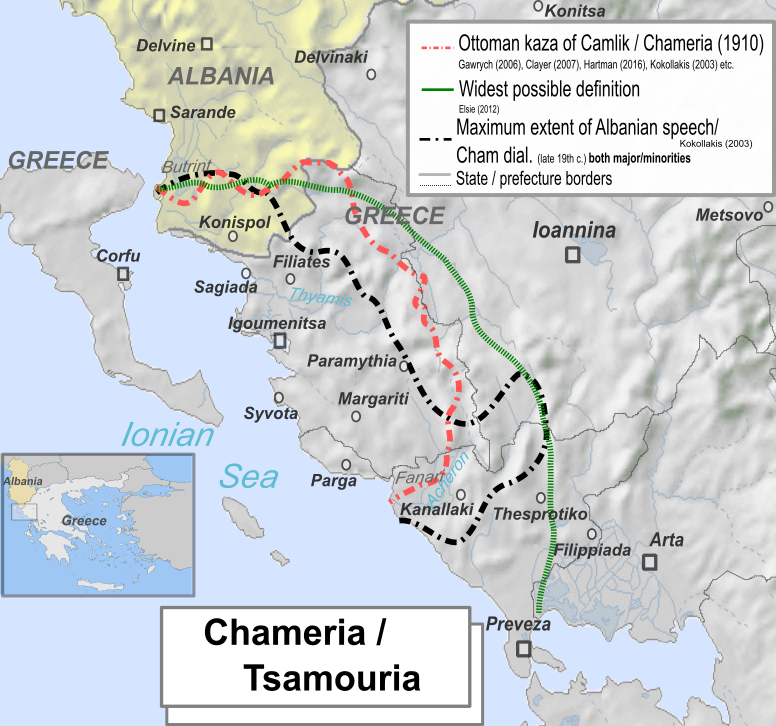|
Arvanites
Arvanites (; Arvanitika: , or , ; Greek: , ) are a bilingual population group in Greece of Albanian origin. They traditionally speak Arvanitika, an Albanian language variety, along with Greek. Their ancestors were first recorded as settlers who came to what is today southern Greece in the late 13th and early 14th century. They were the dominant population element in parts of the Peloponnese, Attica and Boeotia until the 19th century.Trudgill (2000: 255). They call themselves Arvanites (in Greek) and Arbëror (in their language). Arvanites today self-identify as Greeks as a result of a process of cultural assimilation,GHM (1995). and do not consider themselves Albanian.Trudgill/Tzavaras (1977). Arvanitika is in a state of attrition due to language shift towards Greek and large-scale internal migration to the cities and subsequent intermingling of the population during the 20th century. Names The name Arvanites and its equivalents are today used both in Greek (, singular f ... [...More Info...] [...Related Items...] OR: [Wikipedia] [Google] [Baidu] |
Albanians
The Albanians (; sq, Shqiptarët ) are an ethnic group An ethnic group or an ethnicity is a grouping of people who identify with each other on the basis of shared attributes that distinguish them from other groups. Those attributes can include common sets of traditions, ancestry, language, history, ... and nation native to the Balkan Peninsula who share a common Albanian Cultural heritage, ancestry, Albanian culture, culture, Albanian history, history and Albanian language, language. They primarily live in Albania, Kosovo, North Macedonia, Montenegro, Serbia as well as in Croatia, Greece, Italy and Turkey. They also constitute a large diaspora with several communities established across Europe, the Americas and Oceania. Albanians have Paleo-Balkan languages, Paleo-Balkanic Origin of the Albanians, origins. Exclusively attributing these origins to the Illyrians, Thracians or other Paleo-Balkan people is still a matter of debate among historians and ethnologists. The firs ... [...More Info...] [...Related Items...] OR: [Wikipedia] [Google] [Baidu] |
Arvanitika
Arvanitika (; Arvanitika: , ; Greek: , ), also known as Arvanitic, is the variety of Albanian traditionally spoken by the Arvanites, a population group in Greece. Arvanitika is today endangered, as its speakers have been shifting to the use of Greek and most younger members of the community no longer speak it. Name The name ''Arvanítika'' and its native equivalent Arbërisht are derived from the ethnonym ''Arvanites'', which in turn comes from the toponym Arbëna (Greek: Άρβανα), which in the Middle Ages referred to a region in what is today Albania. Its native equivalents (''Arbërorë, Arbëreshë'' and others) used to be the self-designation of Albanians in general. In the past Arvanitika had sometimes been described as "Graeco-Albanian" and the like (e.g., Furikis, 1934); although today many Arvanites consider such names offensive, they generally identify nationally and ethnically as Greeks and not Albanians. Classification Arvanitika was brought to southern ... [...More Info...] [...Related Items...] OR: [Wikipedia] [Google] [Baidu] |
Cham Albanians
Cham Albanians or Chams ( sq, Çamë; el, Τσάμηδες, ''Tsámidhes''), are a sub-group of Albanians who originally resided in the western part of the region of Epirus in northwestern Greece, an area known among Albanians as Chameria. The Chams have their own particular cultural identity, which is a mixture of Albanian and Greek influences as well as many specifically Cham elements.See Hasluk, 'Christianity and Islam under the Sultans', London, 1927. A number of Chams contributed to the Albanian national identity and played an important role in starting the renaissance of the Albanian culture in the 19th century. The Chams speak their own dialect of the Albanian language, the Cham Albanian dialect, which is a Southern Tosk Albanian dialect and one of the two most conservative ones; the other being Arvanitika. During the late 1930s Chams suffered from intimidation and persecution under the dictatorship of General Metaxas. Following the Italian occupation of Albania i ... [...More Info...] [...Related Items...] OR: [Wikipedia] [Google] [Baidu] |
Albanian Language
Albanian (endonym: or ) is an Indo-European language and an independent branch of that family of languages. It is spoken by the Albanians in the Balkans and by the Albanian diaspora, which is generally concentrated in the Americas, Europe and Oceania. With about 7.5 million speakers, it comprises an independent branch within the Indo-European languages and is not closely related to any other modern Indo-European language. Albanian was first attested in the 15th century and it is a descendant of one of the Paleo-Balkan languages of antiquity. For historical and geographical reasons,: "It is often thought (for obvious geographic reasons) that Albanian descends from ancient Illyrian (see above), but this cannot be ascertained as we know next to nothing about Illyrian itself." the prevailing opinion among modern historians and linguists is that the Albanian language is a descendant of a southern Illyrian dialect spoken in much the same region in classical times. Alternative ... [...More Info...] [...Related Items...] OR: [Wikipedia] [Google] [Baidu] |
Albania (toponym)
The toponym Albania may indicate several different geographical regions: a country in Southeast Europe; an ancient land in the Caucasus; as well as Scotland, ''Albania'' being a Latinization of a Gaelic name for Scotland, ''Alba''; and even a city in the U.S. state of New York. Albania (Southeast Europe) Albania is the name of a country in Southeast Europe, attested in Medieval Latin. The name has derived from the Illyrian tribe of the ''Albanoi'' and their center Albanopolis, noted by the astronomer of Alexandria, Ptolemy, in the 2nd century AD. Linguists think that the element ''*alb-'' in the root word, is an Indo-European term for a type of mountainous topography, meaning "hill, mountain", also present in ''Alps''. Through the root word ''alban'' and its rhotacized equivalents ''arban'', ''albar'', and ''arbar'', the term appears as the ethnonym of Albanians in Medieval Greek documents as ''Albanoi'' and ''Arbanitai'', and in Medieval Latin as ''Albanenses'' and ''Arbanens ... [...More Info...] [...Related Items...] OR: [Wikipedia] [Google] [Baidu] |



